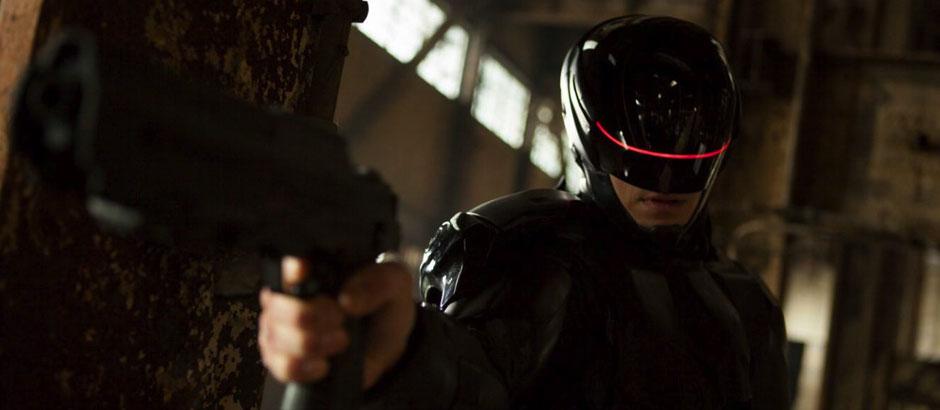The RoboCop reboot has ‘actually succeeded in making a film about a robot cop interminably boring’ says MacDara Conroy
Nearly 30 years on, the original RoboCop still packs a hell of a punch. Paul Verhoeven’s statement-making Hollywood breakthrough is on the face of it a typical ultra-violent ’80s action yarn, but it’s really a Trojan horse for a whole bunch of barely concealed radical ideas (radical in context, anyway). It’s as much a screed against late-stage capitalist America (so prescient in its depiction of the militarisation of police, let alone the fall of Detroit) as it is a biting send-up of consumer culture (“Something with reclining leather seats, that goes really fast, and gets really shitty gas mileage!”).
All that’s enough to cement its legacy as a cult classic, but then you’ve also got a lead in Peter Weller going above and beyond in his dedicated performance as the titular ‘future of law enforcement’, whose personality cannot be fully suppressed by his programming. He doesn’t get enough credit for his work – but I’ll bet you Michael Keaton was watching, as his seminal turn in Tim Burton’s Batman two years later owes a debt to Weller’s masterclass in transcending the mask and rubber suit.
When you’ve already got a movie that’s so good, then, what’s the need for a remake – or in this case, a reboot? Well, there’s no reason why it can’t work as a rule (Scorcese did it with Cape Fear) but there’s plenty of evidence to the contrary (take a bow, Gus Van Sant, for your pointless Psycho remake). And as feared, the new RoboCop falls firmly into the latter category.
Making his English-language debut here, critically acclaimed Brazilian director José Padilha (Bus 174, Elite Squad) retains the original’s basic plot – badly injured policeman gets a new lease of life as a cyborg, eventually hunting down those who wronged him – but flips the premise by pushing the man-versus-machine element to the fore (the new RoboCop is now simply an augmented Murphy, who retains his selfhood and mental faculties, and is in regular contact with his wife and son) while the satire takes a seat way in the back, and continues to recede as the film plods on. And plod it does, because Padilha’s actually succeeded in making a film about a robot cop interminably boring.
That’s compounded by Joel Kinnaman’s lifeless Alex Murphy/RoboCop. He’s a personality void both in and out of the metal suit, which makes a hames of any notions of the triumph of the human spirit. It falls on Gary Oldman’s kindly Omnicorp robotics boffin to fill in those blanks with exposition at distressingly regular intervals. Much of the rest of the story is dictated via countless boardroom scenes staging a witless parody of corporate culture, but at least focussed on a revitalised Michael Keaton. Like Oldman, he’s actually one of the better things in the film, channelling a casual Steve-Jobs-meets-Hank-Scorpio vibe as Raymond Sellars, the CEO with inscrutable intentions.
Alas, they’re stuck in an overlong mess of a movie – two hours that feel like three – that wants to have it both ways as a serious drama and an action flick. So it takes its extreme premise far too seriously (Abbie Cornish as Murphy’s long-suffering wife has a good line in crocodile tears throughout) with extended gaps between the few, poorly choreographed action scenes that could double as Let’s Plays of a crappy FPS (with HUD graphics ripped from the interface in Assassin’s Creed). Forgetting the dodgy battle scenes, some of the special effects do stand out (in particular, the dismantled Murphy is gruesomely mesmerising) but the overall look is too sleek and antiseptic – and commits the ultimate sin of rendering the intimidating ED-209 as an anonymous tank on legs.
Meanwhile, the supporting cast reads quality but, Oldman and Keaton aside, no one brings their A-game. Jackie Earle Haley goes through the motions as a gun-toting weapons expert, the kind of role that should crackle with intensity. Michael K Williams – unforgettable as The Wire‘s Omar – has some spark, but isn’t given any substance (or screen time) as this version’s buddy-cop partner Lewis. And Samuel L Jackson is his usual self, but with silly hair, as a right-wing ‘news’ host with none of the absurd fury of the Glenn Becks or Bill O’Reillys he’s clearly modelled after. Every now and then someone breaks the tedium with a fan-bait meta-reference or throwback to one of the original’s catchphrases, absent the verve that made them so fistpumpingly memorable in the first place. How depressing.
The whole thing is helmed with no real direction or flair, from a script by newcomer Joshua Zetumer that’s not wanting for things to say – about the dehumanising abuses of drone warfare; about notions of free will and determinism (Oldman’s character is even named after the mind-body philosopher Daniel Dennett) – but doesn’t commit to any principle, and even misses the glaringly obvious in its ignoring of Detroit’s urban decay and the threat of human labour’s redundancy in the face of new technology, both central to the original’s story and still topical issues today. But hey, why have a point when you can pay lip service to flavour-of-the-moment leftie ideas while hedging your bets with the right?
The original RoboCop had a point: it was Verhoeven’s answer to questions that needed to be asked. This reboot is full of its own questions, but fails to provide an answer for any of them. Which might be forgivable if it were an entertaining spectacle, but it can’t even manage that much.

